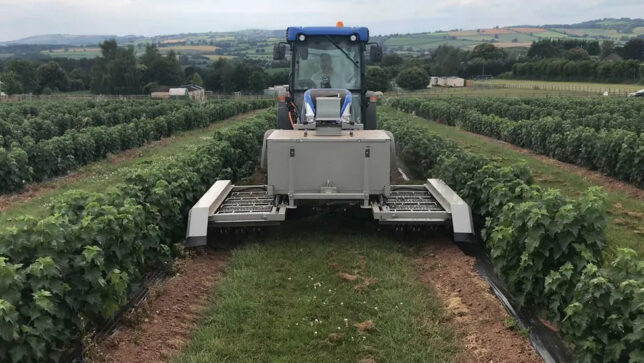PAN Europe released a new report Thursday in collaboration with the European Greens, which shows that much safer non-chemical alternatives exist for all known major uses of glyphosate-based herbicides (GBH) and how the transition to a glyphosate-free agriculture is economically feasible.

This year the EU will decide on the re-approval of glyphosate, the active ingredient of the most popular and controversial weed killer around the world. Exposure to the herbicide not only poses a risk to human health and a variety of living organisms but it also threatens biodiversity and the future of agriculture. European Citizens have already demanded its ban.
Conventional and GMO agricultural systems are currently almost completely dependent on the use of herbicides, including glyphosate. In 2017, glyphosate represented 33% of the total herbicide market in the EU.
While the agroindustry sector claims there are no viable alternatives, the new edition of the PAN Europe report shows that ending glyphosate is not only necessary but entirely possible. Following an extended review of the negative impacts of glyphosate on living organisms and ecosystems in general, the report presents the available alternative methods for weed management for all major uses of glyphosate as well as data on the economics of phasing out glyphosate.
Gergely Simon, chemical officer at PAN Europe said: “Science is clear; glyphosate damages ecosystems including pollinators and beneficial insects, earthworms, soil biota, and causes direct harm to agriculture. Our report on available alternatives to glyphosate delivers a clear message, in fact, there are zero obstacles in banning this harmful chemical substance.”
Weed management, however, is one of the major challenges in agriculture, particularly in arable and vegetable cropping systems but there are other solutions to glyphosate. Dr. Charles Merfield, a world-leading expert in non-chemical weed management and main author of the report says “Managing weeds without the agrichemical herbicides is entirely feasible. Organic farmers and growers have been doing this for over 70 years! Scientists and machinery companies have built up a huge amount of experience, expertise, science, and have developed techniques and many machines for non-chemical weed management.”
Glyphosate Box
Glyphosate Residue Free Certification for Food Brands – Click Here
Test Your Food and Water at Home for Glyphosate – Click Here
Test Your Hair for Glyphosate and other Pesticides – Click Here to Find Our Your Long-Term Exposure
As the report shows there are both low and high-tech safer alternatives to glyphosate in weed management. In this way, farmers may maintain their yields, avoid weeds building resistance, protect soil health and biodiversity, and minimize erosion. In parallel, they protect their own health and that of their families and neighbors, as well as the environment. The report reads as a ‘cookbook’ for working without glyphosate.
The new paper is very timely as EU policymakers are negotiating to cut down pesticide use and risk in half. “Our policy-makers must stand by their commitment to reducing pesticide dependency. Without eliminating glyphosate Europe cannot fulfil EU’s 50% pesticide reduction targets by 2030 set by the European Green Deal and in the Farm to Fork strategy,” added Gergely Simon.
Such a transition requires commitments by policymakers but also by farmers, and should be seen as an opportunity. “Shifting to non-chemical weed management requires changes to the wider farm system, principally diversification, such as a wider range of crops and livestock, in a rotation. This will have multiple benefits for the farm and shared environment, e.g., soil health, biodiversity, fewer novel entities (such as agrichemicals) in the environment, cleaner water and air, and so on. Moving from herbicide-dominated weed management to integrated weed management focused on non-chemical techniques is not therefore a risk, rather it is a huge opportunity to improve all aspects of farm systems including profitability,” Dr. Merfield concluded.



















Regenerative farming is the way to go. Farmers Footprint is leading the way
This is good news! In Africa, the use of chemicals for pest and weed management plus chemical fertilisers is at a threatening rate. Business people and manufacturers of GMOs are forcing farmers to use these chemicals and already , the results are terrible bad!!!
When EU leads in this fight Africa will follow.
Let’s allow farmers to use their age-old knowledge to do sustainable farming!!
Wow. This is wonderful to hear. I hope these products will be available in Canada too.
This is all good – a first step in building the knowledge and systems to growing food instead of money.
The use of off label glyphosate as a desiccant, applied just prior to harvest, is still worthy of separate treatment. I think it’s the obvious reason why glyphosate is in our food chain and we will be disappointed if we get rid of glyphosate for weed control but still smother plants (GMO and non-GMO) with it just before we harvest, process, and eat them.
And there are legitimate uses of glyphosate, eg, clearing electric fences and permanent driveways.
Will you mention the integrated weed management systems. This information will help farmers avoid use of herbicides.
I post and email all information I find on this topic – also on GMOs – to help spread the word. It’s nice to be able to report on something good in this area! This states it can be done! We MUST do it!